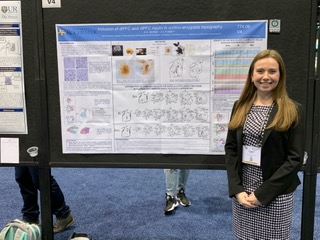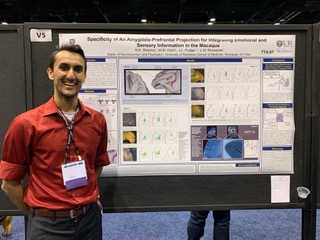Student Presentations from SfN 2019
Friday, November 22, 2019
 Ally McHale (Fudge lab) and
Ally McHale (Fudge lab) and  Keshov Sharma (Fudge-Romanski labs) present their work at SFN 2019.
Keshov Sharma (Fudge-Romanski labs) present their work at SFN 2019.
Welcome to new UR undergraduates joining the Fudge lab
Tuesday, October 15, 2019
Naomi Boxman is working on an Senior Honors Thesis examining connectivity of the mysterious 'Von Economo neurons' in the insula. These large cells are hypothesized to be involved in social learning.
Rochelle Vassell's first love is dopamine, and she has an interest in neurodegenerative diseases, including Parkinson's disease. This coming spring she will help with a project examining how incoming afferent systems differ among specific dopamine subpopulations.
Translating Fear
Thursday, August 1, 2019
Fear is a normal emotion in animals and humans alike, enabling us to stay safe and avoid harm. Human anxiety disorders, including conditions such as post-traumatic stress disorder and social anxiety disorder, are conceptualized as an 'over-reactivity' of normal fear responses, or inability to modulate fear once the response is no longer appropriate. In the last decade, studies have delineated fear circuitry in rodents, to build models of how normal fear responses are instantiated when threat is present, and how fear learning is 'neutralized' by new learning when threat is no longer present (a process known as extinction).
Up until now, these models had not yet been examined in brains similar to those in humans. In a new study, published in Cerebral Cortex, researchers at the University of Rochester Medical Center used very small, paired injections of neuronal tracers in the brains of nonhuman primates, and examined how the amygdala communicates with the primate analogues of the prelimbic (fear) and infralimbic (extinction) PFC. The study, co-led by Keshov Sharma, a third year MSTP graduate student, found that, as in rodent, projections from the basal nucleus of the amygdala exist in nonhuman primates. However, there is also a substantial input from a neighboring region known as accessory basal nucleus, a greatly expanded amygdala nucleus in nonhuman primates and humans.
Welcome to our Summer Undergrads!
Friday, July 26, 2019
This summer we welcome McKenna Uzelac, an undergraduate from Columbia University, and Annie Duan and Apoorva Indraghanty, both from University of Rochester. Annie and McKenna are rising sophomores and getting out-of-classroom lab experience in order to discover the kind of science motivates them most! Annie is helping us to examine the dopamine subpopulations that receive the majority of CRF inputs in monkeys. The goal is to generate insights into how stressors modulate very specific dopamine outputs in higher species. McKenna's project focuses on the amygdala, and the specific ways that higher order sensory and memory cortex project to it. Apoorva, a rising senior, elected to help out this summer while taking Physics, continuing her work with us from the last semester. Apoorva has been instrumental in helping show how two functionally distinct areas of the anterior cingulate, injected with anterograde tracers in the same animal, terminate over similar neuronal populations in the amygdala. Her work, and that of Dr. Emily Kelly in our lab, are important for next-level investigations of whether these 'competing' cortical inputs actually target the same amygdala neurons versus interdigitated neighboring neurons.
We are grateful to our students who took time in their busy summers to work and learn with us.

Annie Duan

Apoorva Indraghanty

McKenna Uzelac